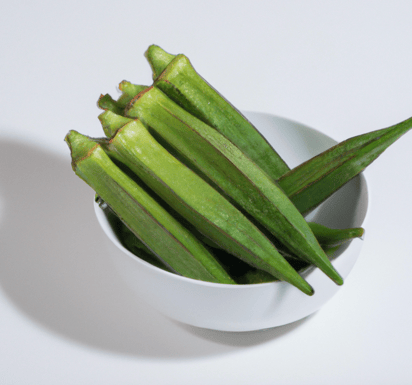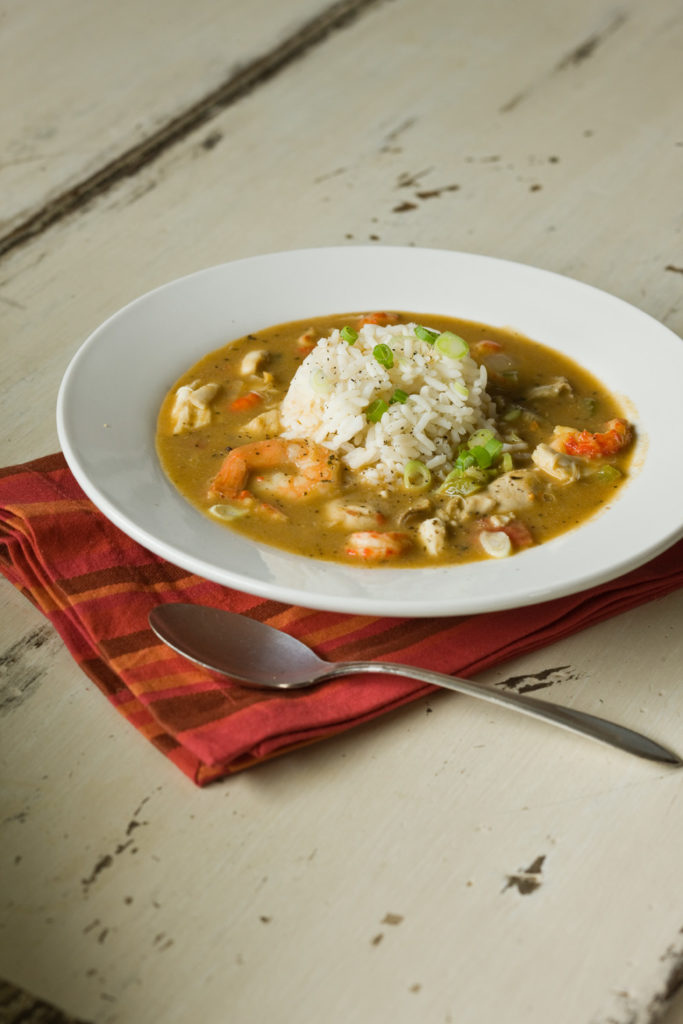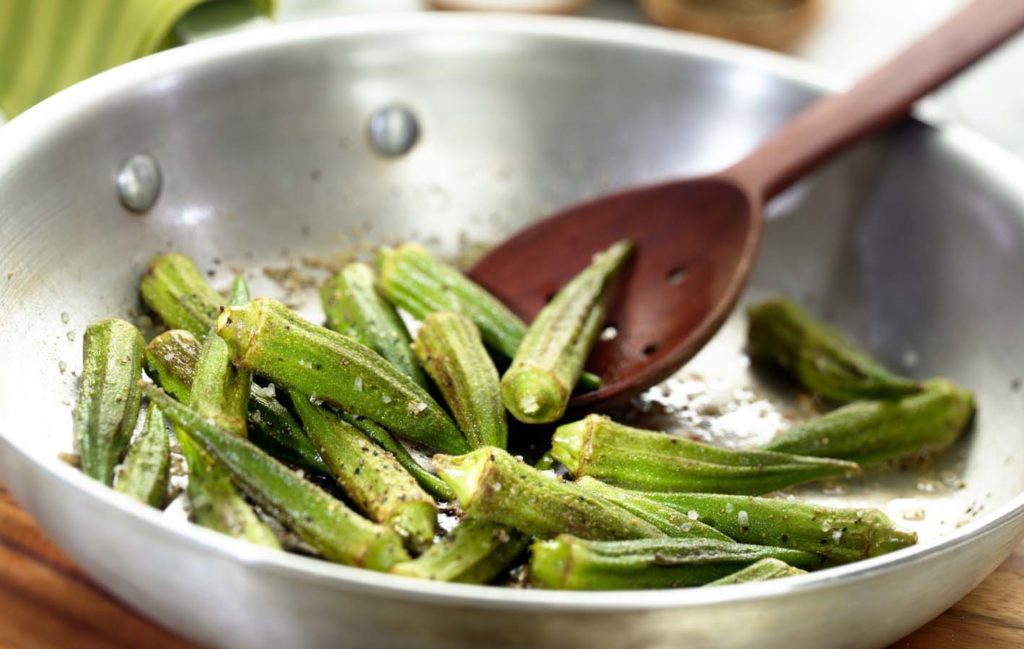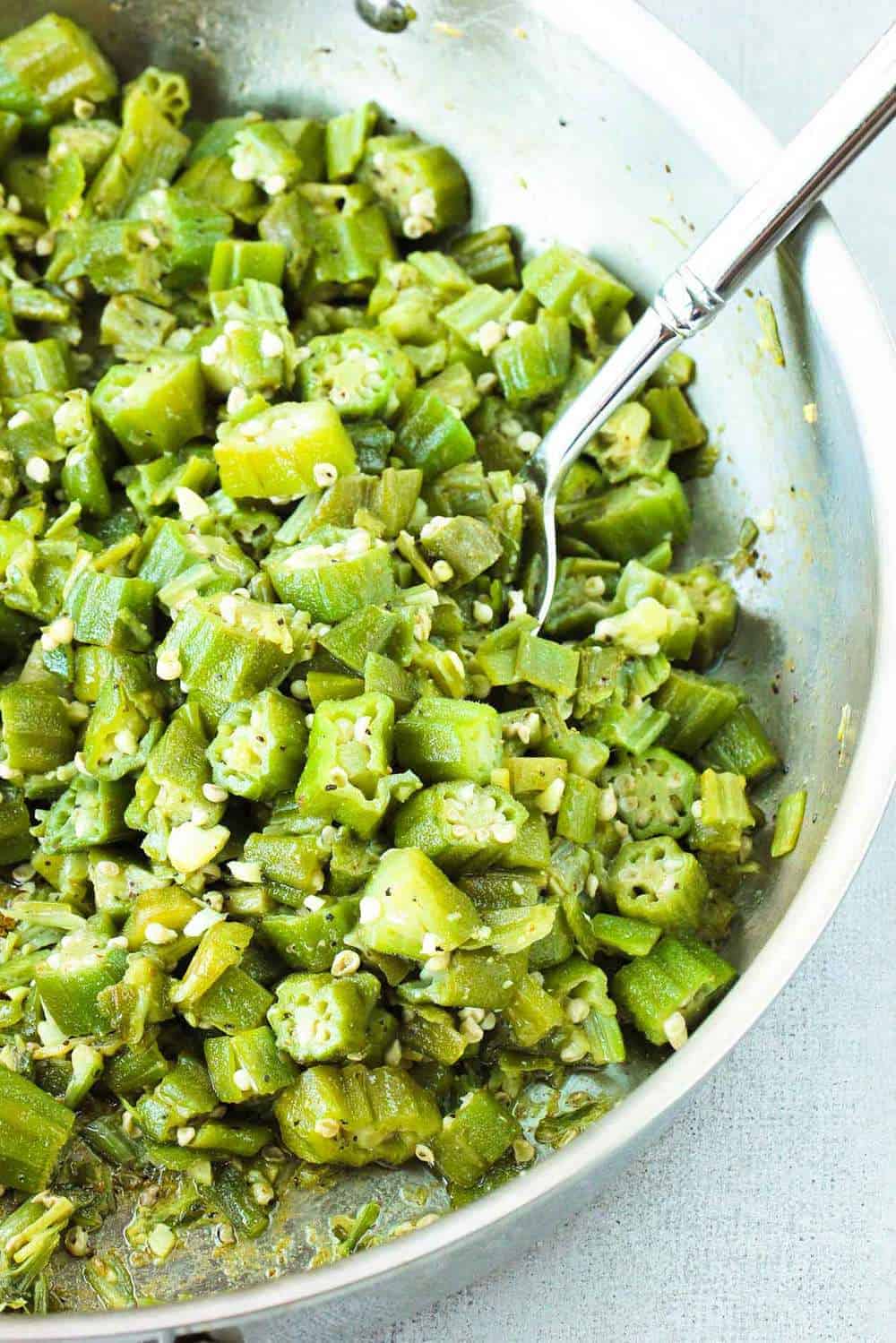Okra: Important Facts, Health Benefits, and Recipes
Explore the health benefits, culinary uses, and history of nutrient-rich okra in our ultimate guide, and learn how to incorporate this superfood into your daily life.

Best Okra Recipes
-

-

-

-

-

-

-

-

-
![Fried Okra Image]()
-
![Brunswick Stew Image]()
-
-
![Chicken Gumbo with Andouille Sausage Recipe Image]()
-
![Stewed Okra and Tomatoes Creole Style Recipe Image]()
-
![Seared Okra and Tomatoes Recipe Image]()
-
![Pickled Okra Recipe Image]()
-
![African Peanut Soup Recipe Image]()
-
![Stewed Okra in Tomato Sauce Recipe Image]()
-
![Cajun Gumbo With Chicken and Andouille Sausage Recipe Image]()
-
![Quicker Chicken and Okra Gumbo Recipe Image]()
-
![Chettinad Chicken Curry with Okra Recipe Image]()
-
![Creole Succotash from 'Treme' Image]()
-
![Dry, Spiced Ladyfingers (Okra) Recipe Image]()
-
![Greek-Style Okra With Tomato, Feta, and Marjoram From 'The New Southern Table' Image]()
-
![Nam Prik Ong (Thai Pork-and-Tomato Chile Dip) Recipe Image]()
-
![<i>Sinigang na Baboy</i> (Filipino Pork in Sour Tamarind Soup) Recipe Image]()
-
![Spiced Okra With Tomatoes Recipe Image]()
-
![The Nasty Bits: Turkey Neck Gumbo Recipe Image]()
-
![Instant Pot Gumbo Image]()
-
![Chicken With Okra Greek Stew Recipe Image]()
-
![Shrimp and Okra With Tomatoes and Rice Recipe Image]()
-
![BBQ Gumbo With Burnt Brisket Ends Image]()
-
![Basic Seafood Gumbo Recipe With Classic Herbs and Okra Image]()
-
![Recipe for Pickled Okra Image]()
-
![Kurkuri Bhindi (Indian Crispy Okra) Recipe Image]()
-
![Deep-Fried Okra Recipe Image]()
-
![Roasted Okra and Tomatoes Recipe Image]()
-
![Tomato, Corn, and Okra Soup Recipe Image]()
-
![A Recipe for Bamia: Meat and Okra Stew Image]()
-
![Crispy Fried Okra With Cornmeal Coating Recipe Image]()
-
![Southern Deep-Fried Okra Recipe Image]()
-
![Spicy Okra and Tomatoes Recipe Image]()
-
![Brazilian Shrimp and Okra Gumbo - Caruru de Camarão Image]()
-
![Simple Roasted Okra Recipe Image]()
-
![Shrimp and Sausage Gumbo Recipe Image]()
-
![Okra Stir Fry Recipe With Chicken and Bell Pepper Image]()
-
![Okra With Seasoned Tomato Sauce Recipe Image]()
-
![Moroccan Okra Tagine Recipe with Tomatoes and Zucchini Image]()
-
![Grilled Okra Recipe Image]()




:max_bytes(150000):strip_icc()/__opt__aboutcom__coeus__resources__content_migration__simply_recipes__uploads__2011__08__chicken-gumbo-horiz-a-1600-1b68a859f0674b939c68b836243d8f3e.jpg)
:max_bytes(150000):strip_icc()/__opt__aboutcom__coeus__resources__content_migration__simply_recipes__uploads__2014__07__okra-stewed-tomatoes-600-horiz-3f095ddaebf247bfad2144aa9cea9672.jpg)
:max_bytes(150000):strip_icc()/__opt__aboutcom__coeus__resources__content_migration__simply_recipes__uploads__2010__08__seared-okra-tomatoes-horiz-a-1600-b4cb6544466d4682b438748ba483a89e.jpg)
:max_bytes(150000):strip_icc()/__opt__aboutcom__coeus__resources__content_migration__simply_recipes__uploads__2012__09__pickled-okra-horiz-a-1600-52db5d3ab47f4a3b9b5e87e43860246a.jpg)
:max_bytes(150000):strip_icc()/african-peanut-butter-soup-recipe-39554-hero-01-5d04efd6e03a43b68710a1d44b55607b.jpg)
:max_bytes(150000):strip_icc()/stewed-greek-okra-1706417-hero-01-c7f36ce4797f46dd9e19d4589e1585c1.jpg)
:max_bytes(150000):strip_icc()/__opt__aboutcom__coeus__resources__content_migration__serious_eats__seriouseats.com__2019__09__20190905-gumbo-vicky-wasik-4I8A7088-d30427daa31d4915b7ce5e27c5919450.jpg)
:max_bytes(150000):strip_icc()/__opt__aboutcom__coeus__resources__content_migration__serious_eats__seriouseats.com__recipes__images__2013__09__20130901-264942-quicker-chicken-gumbo-edit2-41bcdd84d5cb4f4f848a9dc407d712b6.jpg)
:max_bytes(150000):strip_icc()/__opt__aboutcom__coeus__resources__content_migration__serious_eats__seriouseats.com__recipes__images__2012__12__20121212-233462-chicken-chettinad-primary-e2c7757cbb53491b9f9fd7cf05f0eb50.jpg)
:max_bytes(150000):strip_icc()/__opt__aboutcom__coeus__resources__content_migration__serious_eats__seriouseats.com__recipes__images__2013__08__080613-261664-cook-the-book-creole-succotash-8293cc7c6ce74a03a7cf463b5254aa82.jpg)
:max_bytes(150000):strip_icc()/__opt__aboutcom__coeus__resources__content_migration__serious_eats__seriouseats.com__recipes__images__2012__01__20120111-Indian-dry-spiced-ladyfingers-dd8a80975e7c4191a36bdf3d26a651f6.jpg)
:max_bytes(150000):strip_icc()/__opt__aboutcom__coeus__resources__content_migration__serious_eats__seriouseats.com__recipes__images__2014__05__20140512-292527-cook-the-book-greek-style-okra-with-tomato-feta-marjoram-379f44a0ffad49e3938a6137bda9ef90.jpg)
:max_bytes(150000):strip_icc()/__opt__aboutcom__coeus__resources__content_migration__serious_eats__seriouseats.com__2020__10__20201002-nam-prik-ong-derek-lucci-c59798d53272440ea15c1cdf0b196af8.jpg)
:max_bytes(150000):strip_icc()/__opt__aboutcom__coeus__resources__content_migration__serious_eats__seriouseats.com__2019__11__20191030-filipino-Sinigang-na-Baboy-pork-vicky-wasik-14-0c4f581b8fd54f4c84385eaf31633297.jpg)
:max_bytes(150000):strip_icc()/__opt__aboutcom__coeus__resources__content_migration__serious_eats__seriouseats.com__2020__04__20200408-spiced-okra-sho-spaeth-2-57bf0dae6c2d4a44ada1075690389574.jpg)
/__opt__aboutcom__coeus__resources__content_migration__serious_eats__seriouseats.com__recipes__images__20091117-gumbo-thumb-11f661015288472da7faa52b446d432a.jpg)
:max_bytes(150000):strip_icc()/InstantPotGumboHERO-df5b37fdba1d439fb8e138350bc1cd08.jpg)
:max_bytes(150000):strip_icc()/Chicken-and-Okra-Stew-GettyImages-134576127-5a80f6338e1b6e0037269c1b.jpg)
:max_bytes(150000):strip_icc()/okra-shrimp-with-rice-24-56a8b8ce3df78cf772a01adb.jpg)
/bbqgumbo-58ad22703df78c345b27479a.jpg)
:max_bytes(150000):strip_icc()/seafood-gumbo-18-56a8ba3f5f9b58b7d0f4a206.jpg)
:max_bytes(150000):strip_icc()/pickled-okra-recipe-p2-2216859-Hero_01-e9f728e25a8c48d8ba5632505eb72a44.jpg)
:max_bytes(150000):strip_icc()/bhindi-149520542-58868b793df78c2ccd01ccc0.jpg)
:max_bytes(150000):strip_icc()/fried-okra-2217386-hero-01-9a190a3e7e42410ab57a44fc9dce97c5.jpg)
/roasted-okra-and-tomatoes-3058586-2-5b1528148e1b6e00365f9ae0.jpg)
:max_bytes(150000):strip_icc()/okra-and-tomato-soup-3058603-hero-01-703f3c1852a34864a996de85c2c3b4c2.jpg)
:max_bytes(150000):strip_icc()/Bamia-GettyImages-527259676-5989d144d088c00011ab3778.jpg)
:max_bytes(150000):strip_icc()/crispy-fried-okra-15-56a8b8cf3df78cf772a01ae2.jpg)
:max_bytes(150000):strip_icc()/bowl-of-fried-okra-880494000-5b2da9763de42300361ab9cd.jpg)
:max_bytes(150000):strip_icc()/spicy-okra-and-tomatoes-2217328-Hero_01-8c23001e89d64d098f5280785c5e0c51.jpg)
/caruru-57bb81673df78c87633902d3.jpg)
:max_bytes(150000):strip_icc()/roasted-okra-56a5b4ed5f9b58b7d0de0d36.jpg)
/167156847-589cf6f75f9b58819c728574.jpg)
/fried-okra-2217386-hero-01-9a190a3e7e42410ab57a44fc9dce97c5.jpg)
/stewed-okra-and-tomato-over-rice-with-spoon-85508486-584813085f9b5851e584d4a2.jpg)
:max_bytes(150000):strip_icc()/okra-zucchini-tagine-vertical-57c501713df78cc16e1be545.jpg)
:max_bytes(150000):strip_icc()/grilled-okra-2216481-hero-02-d64ff67377dc494a91bf156409cffd3d.jpg)